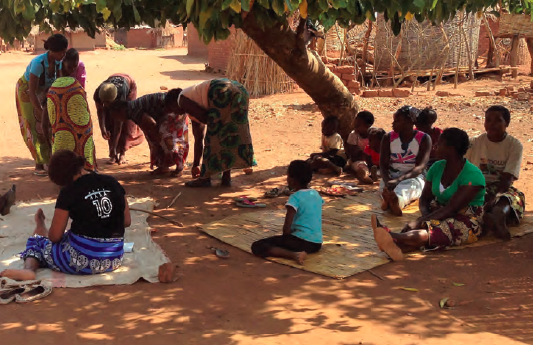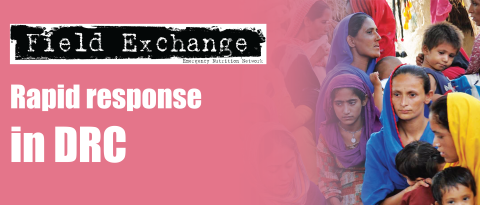Women’s empowerment through food security interventions: a secondary data analysis
By Elizabeth Hohenberger
Elizabeth Hohenberger is a Master’s student in International Agricultural Development at the University of California, Davis. She recently completed her fellowship with the Research and Innovation Fellowship for Agriculture (RIFA), when she worked with the USAID Feed the Future Zambia Mawa Project to measure its impacts on women’s empowerment.
The author acknowledges the work and support of the USAID Feed the Future Mawa Project team; the funder, USAID Zambia (Feed the Future and PEPFAR); and project partners, namely Caritas Chipata, Women for Change, Golden Valley Agricultural Research Trust and University Research Company, LLC. Thanks are also extended to the Zambian Ministry of Community Development and Erin Baldridge, Chief of Party, USAID Feed the Future Mawa Project.
Location: Zambia
What we know: Women’s empowerment impacts on family food security and nutrition.
What this article adds: In Zambia, a CRS-managed, integrated food-security activity targeted key elements of gender inequality that contribute to undernutrition and economic security in 37,000 rural households over five years. A small qualitative study investigated impact on women’s empowerment, defined using the Women’s Empowerment in Agriculture Index (WEAI) and local definitions. Positive impacts on women’s empowerment included greater control over agriculture production, resources and income; men more involved in household chores; and more nutritious child feeding. Men accepted women’s empowerment where it led to household development – better child health, improved agricultural production, and increased income. Fears regarding women’s empowerment related to risk of laziness and divorce (where men’s role as head of household was challenged). For most success, projects to empower women should address broader development goals to increase nutrition and health for children.
Current situation
 In Zambia, barriers to women’s control over land, assets and income cut across the challenges of poor agricultural growth and poor nutrition. The Feed the Future Zambia Mawa Project (2012-2017), managed by Catholic Relief Services (CRS), is an integrated food-security activity linking improvements in both health and nutritional status with improvements in food and economic security. Mawa engages with rural households through nutrition and health services, agricultural extension and community-based savings groups to target key issues of gender inequality which contribute to undernutrition and access to capital. The project has worked with over 37,000 households and their community leaders to support changes in gender dynamics that affect nutrition and economic security.
In Zambia, barriers to women’s control over land, assets and income cut across the challenges of poor agricultural growth and poor nutrition. The Feed the Future Zambia Mawa Project (2012-2017), managed by Catholic Relief Services (CRS), is an integrated food-security activity linking improvements in both health and nutritional status with improvements in food and economic security. Mawa engages with rural households through nutrition and health services, agricultural extension and community-based savings groups to target key issues of gender inequality which contribute to undernutrition and access to capital. The project has worked with over 37,000 households and their community leaders to support changes in gender dynamics that affect nutrition and economic security.
When asked, project staff and representatives of the Zambian Ministry of Community Development familiar with the project say that it has empowered women in Mawa communities. They have observed women, with the support of their partners, participating in activities they had never previously engaged in, such as using their own money to pay school fees. While the project saw the impact of engaging in gender-responsive activities, they did not have a way to measure how the project was empowering women. Thus Mawa partnered with a graduate student from the UC Davis Research and Innovation in Agriculture Fellowship (RIFA) to measure the project’s impact on women’s empowerment. The findings are summarised in this article.
Defining and measuring women’s empowerment
Two approaches were used to define women’s empowerment. The first involved the Women’s Empowerment in Agriculture Index (WEAI) for general parameters. The WEAI is used to measure women’s empowerment in five areas, as compared to control by men: control over agriculture production; access to and control over productive resources; access to and control over income; leadership in the community; and time use. Local definitions (see below) gave context to the five areas of the WEAI and allowed men and women to share local priorities and perceptions of women’s empowerment.
The second approach was to ask men and women in Mawa communities for their own definitions. Both genders defined women’s empowerment in ways that aligned, for the most part, with the WEAI. They expressed the belief that women’s empowerment is the inclusion of women in decision-making and budgeting income (decisions over agriculture production, access to and control over productive resources, access to and control over income), as well as the participation of men in household tasks to reduce women’s labour (time use). Outside the WEAI, women and men also stated that women’s ability to feed children nutritious food was an example of women’s empowerment.
Together, Mawa and RIFA identified households from four different Mawa groups: those in farmer groups; mothers receiving home visits from nutrition volunteers in care groups; members of savings and internal lending communities (SILC); and participants in gender education.
Members of the Zambian Ministry of Community Development were trained to conduct single-gender Focus Group Discussions (FGDs) with each of the identified groups. These discussions were used to learn about local definitions of women’s empowerment, time use and expenditure priorities and responsibilities. Individual interviews with 15 households were conducted to explore topics shared in the focus groups.
Mawa’s impact on women’s empowerment
Control over agriculture production, access to and control over productive resources, access to and control over income
All 15 households interviewed stated that women are now involved in budgeting and keeping of money after participating in Mawa, whereas previously they had not been. One woman told us, “[Before Mawa] my husband went to sell and I had no knowledge of the money…[now] after selling, my husband comes home with the money and sits with me” to make a budget. Men are happy about including their wives in budgeting because they feel that men are bad at keeping money; when women are involved, there is more development in the household. Focus groups of men explained this, saying “Women have good ideas for development in the home,” and that men are “careless with money and can spend it on beer.” One man explained in his interview that “women won’t spend money anyhow,” and that his wife will be able to “purchase things for the family, even when I am not around.” Women’s larger voice in income has led to an increase in decision-making in agricultural production and productive resources. They are able to help their husband’s prioritise fertilizer and seed during budgeting. Furthermore, women participating in SILC see an even greater control over income in that many set aside money to invest in their savings groups during household budgeting, or contribute their annual share to purchase farming inputs and other important expenditures.
Time
Men and women in 13 households say that women are receiving more help with household chores, either from their husbands or from their children, after participation in Mawa. Dramas performed by focus groups depicting life before Mawa showed women and children doing all the field and household work. However, in interviews, men and women say that because of Mawa, men have seen that their wives have a lot of work to do and have begun helping in household chores. Reduced workload has increased the time available to women to rest and to participate in other Mawa activities. Men and women say that it is important for women to rest to regain strength. Men say that they do housework to let their wives rest.
Nutrition
Households in which the wife participates in a care group had a greater focus on improved nutrition and health of their children when discussing women’s empowerment. Men and women say they “know how to feed their children nutritious food now, as compared to before Mawa”. Including men in these discussions has led to an increased prioritisation of children’s health and increased participation of fathers in household chores related to childcare. As a result, women are finding the time to rest and care for themselves. Rest during pregnancy has a direct impact on the health of the child and may contribute to men’s incentives to help their wives rest.
Criticisms and fears about women’s empowerment
During the focus group discussions, men and women expressed a concern that women’s empowerment can make women lazy or lead to divorce. During interviews, participants told us that women’s empowerment and sharing of housework could lead women to demand that men work more, while women “just sit.” One woman told us that women may think they have “more power in the house because of empowerment.” Men said that if women don’t come to the field when men do, women are lazy. Men state they are the heads of the household and pay the bride price, so if women think they have more power than their husbands, they will divorce. Men do not want to relinquish their position as head of the household.
Men are happy including women in decision-making and budgeting and participating in household chores when the result is development in the household. They see the impact in the improved health of children, improvement of agricultural production and increase in income. Yet it is important to note that during focus group discussions and interviews, both men and women emphasize men as the head of the household and the one who has more power. Eleven households stated that the man makes most of the decisions because he is the head of the household. There is genuine fear that women may become “more powerful” than their husbands and inclusion of women in decisions regarding the household and income come with limitations.
Discussion
This small study is consistent with observations from project monitoring visits and Field Supervisor’s monthly reports. For example, husbands have shared stories about times when they were away from home and their wives made sales (of maize) in their absence to generate cash for important expenses around the house. The men were relating this as a good thing when, in some communities, a woman could be beaten for taking such a decision without her husband’s instruction. Both men and women appreciated the value of being able to share responsibilities flexibly, depending on who is available and trusting that the other will do the right thing with the resources for the family’s wellbeing. When discussing joint budgeting and planning, men often point out that women remember and prioritise different things, which helps the whole family consider a broader set of needs.
The increased inclusion of women in these responsibilities demonstrates an understanding that women are contributors to the household, too. Men are also recognising the positive effects of their own contributions to home care. The result is an increased cooperation within the family in both productive and reproductive responsibilities, a key ingredient in promoting the “household development” that focus groups and interviewees lauded as a benefit of gender equality.
Men’s concerns about weakened authority in the household, however, can impede projects that hope to be gender-transformative and include stand-alone or explicit women’s empowerment in their objectives. Focus on equal contribution to household development and overcoming gender-barriers to increase nutrition and health for children in project messaging will have better success in impacting the areas of the WEAI than aiming to empower women without also addressing these broader goals.
For more information, contact: Elizabeth Hohenberger, email: emhohenberger@ucdavis.edu


